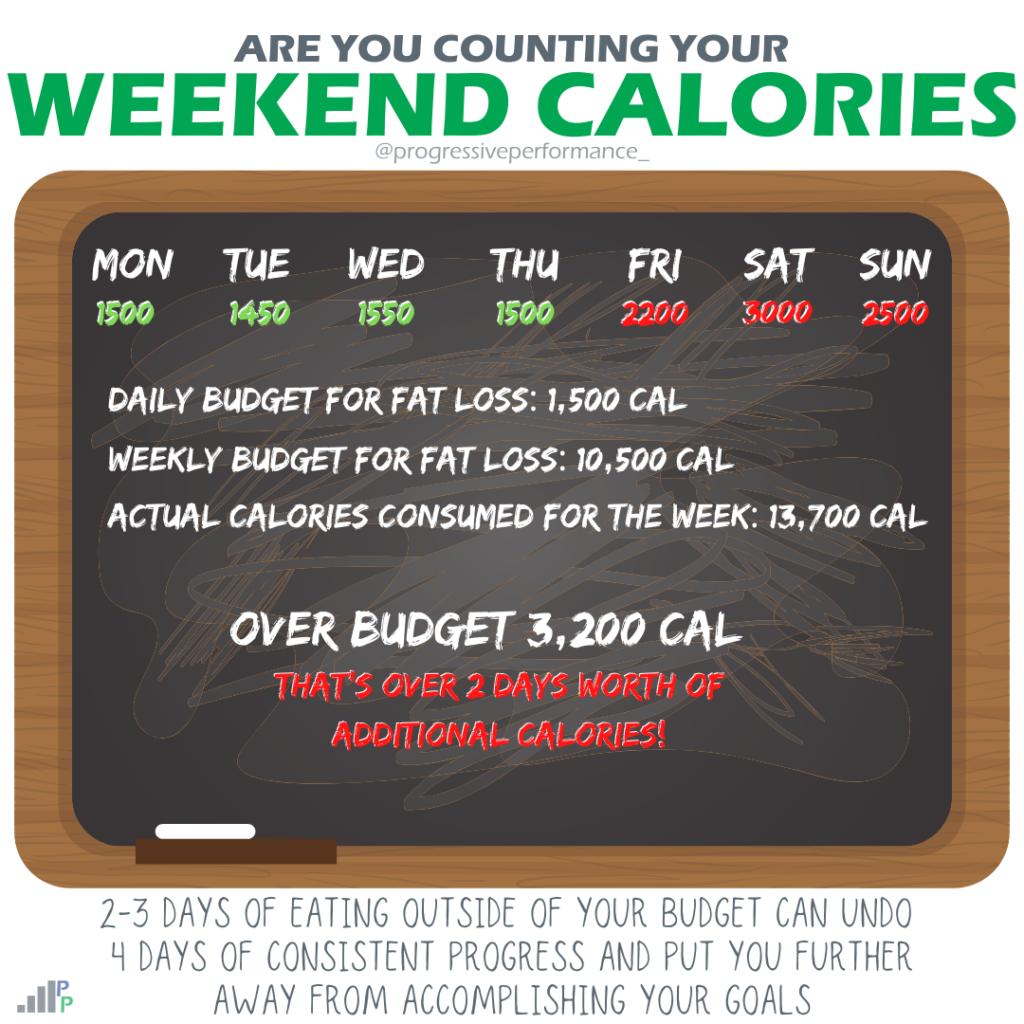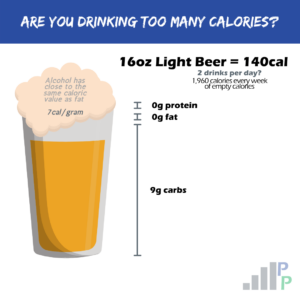As a nutrition coach, one of the most common things I hear from new clients is that they eat “really good” during the work week, but then the wheels fall off with their weekend nutrition. Less optimal weekend nutrition is often due to a multitude of reasons: social events, date nights, alcohol, meal prep and planning. If you have scale goals you are working towards, your nutrition strategy is what will help you see progress happen, along with a structured strength training program of course. Let’s talk about it how you should be thinking about your weekday nutrition along with your weekend nutrition!
Table of Contents
ToggleBudgeting Your Calories for Weight Loss
The most important foundational rule for weight loss is a simple one. Weight loss on the scale comes down to your energy balance: are you expending more calories than you are taking in on a daily basis. It doesn’t matter what foods you are eating, or what specific ‘diet’ you are following.
If your calorie balance isn’t correct (i.e. you’re eating an excess of calories compared to your expenditure), then you won’t see the progress you want on the scale. Even if you are right on the target during the week, the extra calories on the weekends do count and will contribute to moving you away from your goals. Weekend nutrition should be just as important as your work week nutrition.
For our clients, I give them a daily calorie budget that I expect them to stay within, along with macronutrient goals (protein, carbohydrate, and fat) that will help them feel satiated and give them the energy needed to perform their workouts at the gym, long days at work, and in their daily lives too. By keeping themselves accountable to their daily calorie budget and macronutrient goals they can be sure to choose the foods, and beverages, on which they decide to consume are nutrient-rich and worth spending on their calorie budget.
A properly balanced nutrition plan, with a calorie budget that doesn’t leave my clients feeling deprived day after day, is what I recommend to my clients who are interested in building healthy habits for their lifelong nutrition strategy. What do I mean by properly balanced? I’m talking about macronutrients: carbohydrates, protein, and fats.
All three play important roles in the daily functioning of your body, and we need a combination of all three for a sustainable nutrition strategy. Finding a balance that allows you to feel satiated, and provides your body the building blocks to build and exert strength, power, confidence. Once you have your daily calorie budget, we can look at the larger picture of your weekly calorie budget.
Like I mentioned earlier, most people are successful with their nutrition strategy during the work week, but by the time the weekend rolls around those calorie budgets and macro goals seem to be a distant memory, causing your weekend nutrition strategy to negatively impact your total seven day calorie budget. But by not adhering to your budget on Friday, Saturday, and Sunday you’re going to undo all of the fantastic progress you made during the week!

Remember, just because you did great during the week doesn’t mean you need to reward yourself with food and beverages that aren’t goal-oriented. We aren’t dogs who need treats for obedience.

What About Cheat Days?
You’ve probably heard about ‘cheat days’ from people who have been working to lose weight, when they go ‘off diet’, eating and drinking anything and everything they want because they’ve been ‘on diet’ all week long depriving themselves of the foods they actually want to eat.
Read that sentence again. Tell me that doesn’t sound like an unsustainable and unhealthy lifestyle.
Partaking in ‘cheat days’ just perpetuates an unhealthy relationship with food and the yo-yo diet mentality. Cheat days can also lead to disorder eating habits like binge eating, which can quickly spiral into feelings of guilt or shame, over-exercising, or even purging.
For extremely dedicated and consistent athletes, bodybuilders, and powerlifters, their nutrition coaches, dieticians, etc. will recommend refeed days. To the untrained eye, it does look like a cheat day, however it is quite structured with a calorie budget and macro goals that the individual is aiming for, and not just eating without an awareness of their goals.
A sustainable and healthy lifestyle and nutrition strategy is one that allows you to make the foods you like fit into your calorie budget while working towards (and making progress towards) you scale and physique goals.
So… no don’t think about your weekend nutrition as an opportunity for a cheat day (or days).
How to Fit Alcohol into Your Calorie Budget
Another factor for most people’s weekend nutrition is alcohol consumption. It plays a pretty major role in your body’s ability to process nutrients, as well as your decision making skills.
Alcohol is actually a macronutrient as well (remember our calories are derived from macronutrients: carbohydrates, proteins and fats), but we don’t talk about alcohol in the same way because the calories in alcohol are non-nutritive.
Let’s look at the base caloric value of all of the macronutrients:
Nutritive:
Protein = 4 calories per 1 gram
Carbohydrates = 4 calories per 1 gram
Fat = 9 calories per 1 gram
Non-Nutritive:
Alcohol = 7 calories per 1 gram
Caloric Value of Macronutrients

The simplest way to fit alcohol into your calorie budget (either weekday or weekend nutrition) is to swap out some of your calories from fat, that will leave you with a little wiggle room for any additional calories if you’re having a mixed drink, or glass of wine, which will throw in a few more calories from carbohydrates.
Alcohol’s Effect on EVERYTHING
One of the biggest reasons why people choose alcohol is to relax, or remove inhibitions in social situations. That same effect also happens within your body, slowing or inhibiting your metabolism (i.e. keeping your body from processing the calories as efficiently).
Alcohol consumption also removes your inhibitions when it comes to making goal-oriented food choices. Have you ever been out to a bar with friends having a few drinks, all of a sudden the waiter/waitress comes by to see if you want any food with your next round, and before you know it the table has a few baskets of fries, chicken wings, and nachos?
We’ve all been there. Had you not had a drink, you would have an easier time determining that fries, wings, and nachos are not where you want to spend your calorie budget.
What else gets affected by alcohol consumption? Your sleep! Sleep is one of the biggest secrets to weight loss – check out our blog on The Power of Sleep on Achieving Healthy Weight Loss. Poor sleep quality perpetuates poor weekend nutrition.
Building Healthier Habits for Weight Loss
Our most successful nutrition clients are able to still enjoy the foods they love, drink alcohol on occasion, and still reach their weight loss goals, but they are mindful of their daily (and weekly) calorie budgets and make goal-oriented decisions 85-90{885586236f5820200058e61f9e2fcec1023d525f8b1a6e4e5a4fd7f3c0d65acb} of the time.
If you’re ready to learn how to build lifelong healthy nutrition habits, our nutrition program is waiting for you! An email to [email protected] is where it all starts! A coach will be in contact with you soon!



